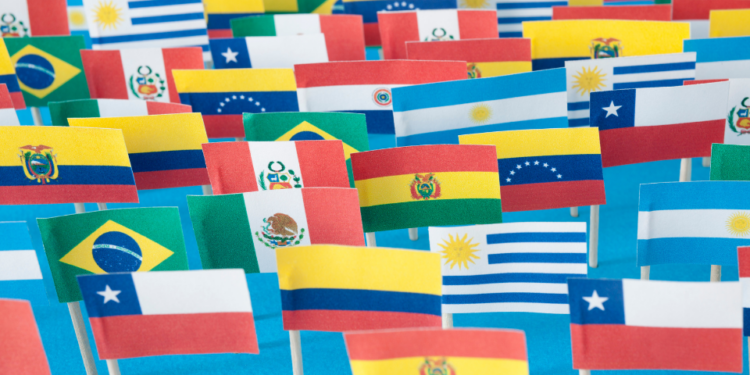The progressive regional current, the “Pink Tide,” could be better called “troubled waters” in 2024. The tide had already slackened by 2023 compared to its rise in 2022, when it was buoyed by big wins in Colombia and Brazil. Then, progressive alternatives had sailed into power replacing failed neoliberal policies. Since, they have had to govern under circumstances that they inherited but were not their own making.
By Roger D. Harris and John Perry
Brazil’s “suicidal veto” in August, which excluded Venezuela and Nicaragua from the BRICS trade alliance, was indicative of triangulating between the US and regional allegiances. The action likely pleased Washington but shattered an already tattered progressive unity in the region.
Brazil, along with Colombia and Chile, respectively represent the first, fourth, and fifth largest regional economies, all of which are faltering. Their left-leaning presidents – Boric of Chile, Petro of Colombia, and Lula of Brazil – are up for reelection on December 2025, May 2026, and October 2026, respectively. All lack parliamentary majorities at home, face strong rightist opposition, and have growing right-leaning evangelical populations making their prospects problematic. With such precarious positions, challenging the hegemon of the north is risky.
Boosting progressive prospects, left-leaning Claudia Sheinbaum became Mexico’s first female president in October with a landslide 60% of the vote and a coalition holding a 73% parliamentary majority. Mexico represents the second-largest regional economy and has been an outstanding proponent of regional unity.
Great power competition
The US is further projecting its military presence in the region, being by far the largest source of military aid, supplies, and training. Much ink has been spilt on the second coming of Donald Trump. He is likely to maintain the bipartisan and increasingly aggressive projection of US power in the region and, indeed, globally, as enshrined in Biden’s National Security and National Military strategy documents.
In this, the 201st year of the Monroe Doctrine, Washington is intent on trying to contain China’s growing influence in the region and to a lesser extent that of Russia and even Iran.
China is now second only to the US in terms of regional trade volume. Its Belt and Road Initiative now includes 21 of 26 of the region’s eligible countries. The China-dominated BRICS trade alliance, where Brazil is an original member, expanded this year when Bolivia and Cuba joined as “partner countries.”
China has been cautious about military involvement in what the US has long maintained as its sphere of influence. Russia has been less so, declaring Venezuela, Cuba, and Nicaragua as strategic partners.
Washington’s supply-side solutions
Regional challenges include narcotics trafficking and migration. Washington’s solutions have been to attack the sources while ignoring the causes.
Typical of the inside-the-beltway mindset, Will Freeman in Foreign Affairs blames Washington’s “neglect” of the region for these problems when the opposite is the case with widespread US interference and sanctions against Venezuela, Cuba, and Nicaragua.
Besides, the Yankees have never “neglected” the region as evidenced by many US-backed coup attempts. The corporate press’s inattention to the Global South should not be confounded with an imperialist project perfectly capable of multitasking.
Migration
US President Biden made various attempts to restrict migration and outpaced Trump in number of deportations, according to Reuters. Although surpassing Trump’s record, former President Obama still holds the title of “deporter in chief.”
Washington acted against companies flying migrants to Nicaragua, where some countries like Cuba have visa-free entry, by threatening or imposing sanctions. Nicaragua was falsely accused of “trafficking” migrants.
Biden nevertheless welcomed more educated or entrepreneurial migrants under his “humanitarian parole” program, which permits to enter the US and work for two years. Initially offered to Venezuelans, it was later extended to people from Haiti, Cuba, and Nicaragua, with over half a million arrivals by late 2024.
US President-elect Trump’s promise of massive deportations is a concern to the many regional countries where emigration is an issue. The practicalities of implementation are formidable, including whether countries will agree to receive returnees. Significant numbers returning could be destabilizing in a country like Honduras, where remittances contribute 26% of GDP and poverty levels are high.
The other pandemic – illegal drugs
The role of the US and its Drug Enforcement Administration, in most countries in the region, is problematic. Washington’s staunchest allies repeatedly turn out to be major drug pushers. Former Honduran President Juan Orlando Hernández is now in US federal prison on drug charges.
The corporate press in the US continuously runs sensational reports about drug kingpins in Latin America but curiously none on the US side of the border. How is it that the US is the biggest consumer, but we don’t hear about cartels who distribute the drugs at home?
“The unspoken truth known to virtually all parties in the Drug War,” according to The Nation, “is that the net flow of drugs is unlikely to change so long as consumption in the US continues to grow.” This highlights the fallacy of “supply side” solutions while ignoring the demand side.
Political opposites Nicaragua and El Salvador have had successes in keeping narcotics-related violence at bay. El Salvador has wielded “la mano dura” (the iron fist), while Nicaragua uses community-based policing. The two countries have among the lowest homicide rates in the region.
Meanwhile neighbouring Costa Rica has seen an unprecedented surge of drug-related violence. Mexico along with Brazil, Ecuador, Colombia, Honduras, and Guatemala have all had to deploy their militaries in major operations to wrest control of prisons and/or parts of their national territories from narcotics cartels.Â
What’s left
In the absence of a world socialist bloc, countries striving for socialism must engage in the international capitalist market. There they are vulnerable to economic warfare designed to overthrow their political leadership. The ever-tightening US sanctions on Cuba, Venezuela, Nicaragua are designed to ensure that socialism does not succeed; to strangle in the cradle all possible alternatives to the established imperial order.
While Washington may seek to accommodate social democracies by cooption, nothing but regime ruination is slated for the states explicitly striving for socialism. The sobering reality is that countries striving for socialism, struggling for survival, are retrenching and being forced to adopt neoliberal remedies.
China, Russia, and Iran offer vital life support but do not rise to the level of the socialist solidarity of the former USSR.
Biden renewed US sanctions against Nicaragua in November by again proclaiming it was an “unusual and extraordinary threat to the national security.” Nicaragua has allocated only 3% of its budget to the military, while a full 61% addresses social welfare, especially public health.
For the 32nd time in so many years, the US blockade of Cuba was condemned by the UN General Assembly in October. Biden imposed yet more sanctions and continued Trump’s listing of Cuba as a state sponsor of terrorism. Life is simply hard in Cuba under the US siege and is getting harder. This has led to unprecedentedlevels of out migration.
The left in Bolivia is consumed by internecine warfare between former president Evo Morales and his former finance minister and now president Luis Arce, while the economy declines precipitously. Presidential elections are scheduled for next July, with prospects for the left to continue in power looking increasingly dim.
In 2022, left-leaning Honduran President Xiomara Castro replaced the neoliberals who initially came to power in the US-backed 2009 coup. Castro, herself, may be next in line for a US-backed coup. Castro inherited security forces trained in the US, corruption, drug violence, and a weak economy. She is trying to wrest control of the country back from “mafia style” domestic and foreign corporate forces, before facing reelection in 2026.
Venezuela’s pivotal role
The leading left role of Venezuela is pivotal in the region. For example, were the leftist government of Venezuela to fall, the futures in particular of Lula in Brazil and Petro in Colombia – both countries sharing a common border with Venezuela – would be uncertain.
Against the seemingly unsurmountable US blockade, Venezuelan President Nicolás Maduro has led a remarkable economic turnaround with one of the highest GDP growth rates in the hemisphere. Three-quarters of the national budget is now allocated to social programs. Still, the most vulnerable have benefited the least, which is the aim of US sanctions.
President Maduro was reelected to a third term in July. But the US and its allies have waged a campaign to delegitimize the election as part of their larger regime-change efforts. Washington actively interfered in the election, backing the extreme rightwing candidacy of political unknown Edmundo González. Four months later, the US anointed González “president-elect.” Now in voluntary exile in Spain, González threatens to return to be inaugurated in January, amid fears of US military intervention.
The US has surrounded Venezuela with bases in Colombia (a NATO “global partner”) and a US Security Cooperation Office in Guyana. Offshore, the US has bases in the Dutch colonial possessions of Aruba and Curaçao and an agreement to deploy forces to Trinidad and Tobago in the event of a “conflict” in Venezuela.
A year ago, the disputed Essequibo territory between Venezuela and Guyana became an international flashpoint. The US Southern Command conducted joint air operations with Guyana. What is in essence an oil company landgrab by ExxonMobil is disrupting regional unity and is a Trojan horse for US military interference.
What’s right
A populist right has emerged regionally and globally, a symptom of the failure of neoliberalism and the inability of social democracies to provide an effective alternative.
Javier Milei assumed the presidency of Argentina a year ago, a “dream victory” for Washington.
The ultra-right enfant terrible abandoned his campaign threats to dollarize the economy, incinerate the central bank, and break relations with China. But he has presided over a radical privatization program, slashed spending on public welfare, and devalued the currency. This has precipitated a 53% poverty rate, the highest in 30 years. The crusader against “left culture” has somewhat curbed inflation and has an approval rating a little short of 50% in South America’s second-largest economy.
El Salvador’s President Nayib Bukele has trampled civil liberties in a draconian crackdown on gangs while managing a precarious economy. He enjoys astronomical approval ratings. In contrast, the unelected president of Peru, Dina Boluarte, is the world’s most unpopular head of state, presiding over an economy in harsh recession.
Ecuadorian President Daniel Noboa, from the country’s richest family, plans to allow US military bases there. Noboa runs for reelection in February, where he is neck-and-neck in the polls with leftist Luisa González. Noboa beat González in the previous election, but his approval ratings are tanking due to ongoing security and energy crises and a stagnating economy. Unsurprisingly, the US is interfering in the elections.
A better world is possible
The deliberately failed state of Haiti is what an alternative future might be like under Yankee beneficence. US-led attempts to control Haiti have left the country in ruins. Activist Seth Donnelly describes the “slow motion genocide” there.
A more progressive world is likely to be a multipolar. It is slowly developing in Latin America, haltingly and with setbacks, many due to US imperialism. Washington’s “rules-based order,” far from orderly, is under threat worldwide, and nowhere closer than in Latin America.
Roger D. Harris is with the Task Force on the Americas, the US Peace Council, and the Venezuela Solidarity Network. Nicaragua based John Perry is with the Nicaragua Solidarity Coalition and writes for the London Review of Books, FAIR, and CovertAction.
Source link : http://www.bing.com/news/apiclick.aspx?ref=FexRss&aid=&tid=676c530393dc4778b3b6af2816977b32&url=https%3A%2F%2Fwww.pressenza.com%2F2024%2F12%2Fwhats-left-in-latin-american-and-the-caribbean-year-2024-in-review%2F&c=17998503557617289390&mkt=en-us
Author :
Publish date : 2024-12-25 05:24:00
Copyright for syndicated content belongs to the linked Source.












